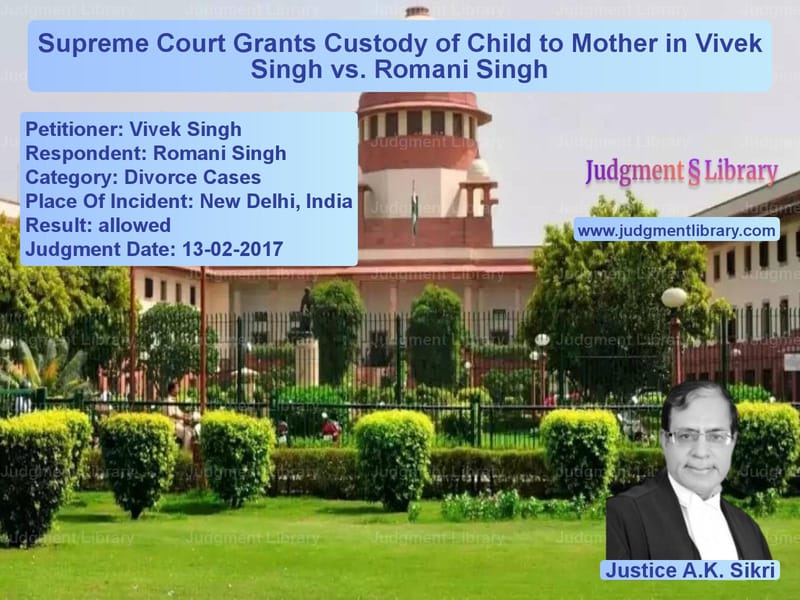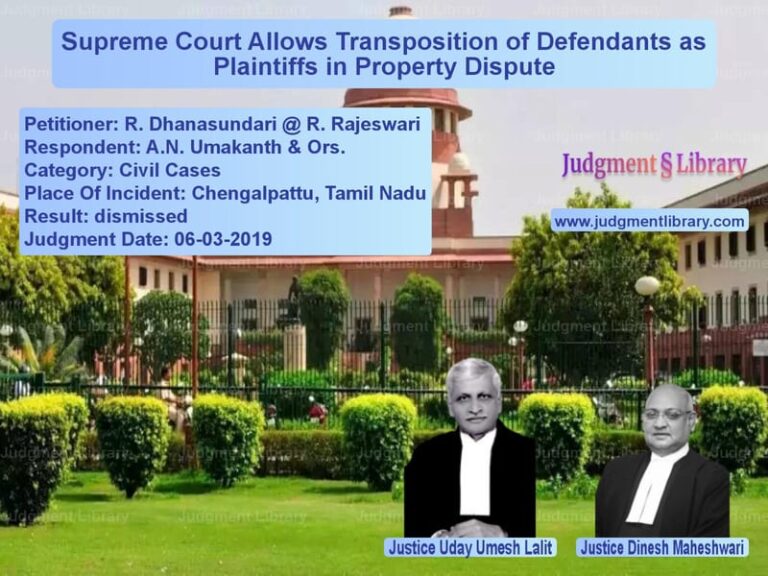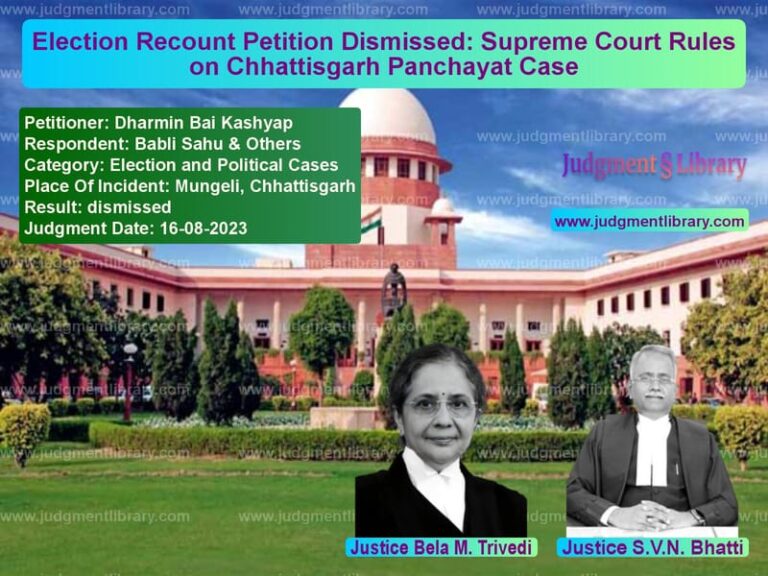Supreme Court Grants Custody of Child to Mother in Vivek Singh vs. Romani Singh
The Supreme Court of India, in its judgment dated February 13, 2017, ruled in the case of Vivek Singh vs. Romani Singh. This case revolved around a custody dispute between a father and a mother regarding their minor daughter, Saesha Singh. The Court ultimately decided to grant custody to the mother, highlighting the importance of a child’s welfare and the role of the mother in a child’s upbringing.
Background of the Case
Vivek Singh, an army officer, and Romani Singh, a teacher, were married on November 25, 2007. Their daughter, Saesha Singh, was born on October 29, 2008. However, their marital relationship deteriorated, and by August 4, 2010, Romani left the matrimonial home due to severe marital discord.
At the time of separation, Vivek retained custody of the child, preventing Romani from taking her along. Subsequently, Romani filed a petition under the Guardians and Wards Act, 1890, seeking custody of Saesha, arguing that she had been the primary caregiver and was best suited to take care of her.
Petitioner’s (Mother’s) Arguments
Romani Singh, the mother, argued that:
- She had been the primary caregiver since birth and had taken care of Saesha’s daily needs.
- As a schoolteacher, she had a stable job that allowed her to provide a better nurturing environment for the child.
- Vivek’s military duties required him to be away for long hours, leaving Saesha in the care of subordinates or helpers.
- A girl child, especially at a young age, requires the care and affection of her mother for overall development.
- The principle of welfare of the child should be the paramount consideration in custody matters.
Respondent’s (Father’s) Arguments
Vivek Singh, the father, contended that:
- Since August 2010, Saesha had been under his exclusive care and was happy and settled with him.
- Romani had voluntarily abandoned the child during the separation.
- He had provided for all of Saesha’s financial and emotional needs without any contribution from the mother.
- Shifting custody to the mother would disrupt the stability and comfort that Saesha had developed over the years.
- The child had expressed a desire to continue living with him.
Judicial Observations
Justice A.K. Sikri, delivering the judgment, made several key observations:
“The welfare of the minor shall be the paramount consideration.”
“A child’s best interest must be considered with a long-term perspective, ensuring a nurturing and stable environment.”
“The role of a mother in shaping a child’s early years is irreplaceable, especially in the case of a girl child.”
The Supreme Court also considered the psychological well-being of Saesha. The Court noted that due to prolonged separation, Saesha had grown closer to her father and had expressed a preference to stay with him. However, the Court found that such an opinion from a child of her age might be influenced by the environment in which she was raised.
Supreme Court’s Ruling
After carefully considering the facts, the Supreme Court ruled in favor of the mother, stating that:
- A girl child should be under the care and guidance of her mother.
- The mother had consistently sought custody and had never abandoned her parental responsibilities.
- The child’s current attachment to the father was due to circumstances beyond the mother’s control, and a reintroduction to her mother’s care was necessary for long-term emotional stability.
- Saesha’s admission in a school where her mother was teaching would provide additional emotional security and parental guidance.
- The custody should be transferred gradually to ensure a smooth transition.
Visitation Rights for the Father
To maintain a meaningful relationship with both parents, the Court granted the father visitation rights:
- Vivek Singh was allowed to take Saesha home on the fourth Friday of every month until Sunday evening.
- During summer vacations, he could have custody for 15 days.
- During winter vacations, he could have custody for 4 days.
- On Saesha’s birthday, he would have visitation rights for four hours.
Conclusion
The Supreme Court’s ruling in Vivek Singh vs. Romani Singh reaffirmed the principle that the welfare of the child is of paramount importance in custody disputes. The decision recognized the critical role of a mother in a child’s upbringing and ensured that the father retained meaningful involvement in the child’s life through structured visitation rights.
Don’t miss out on the full details! Download the complete judgment in PDF format below and gain valuable insights instantly!
Download Judgment: Vivek Singh vs Romani Singh Supreme Court of India Judgment Dated 13-02-2017.pdf
Direct Downlaod Judgment: Direct downlaod this Judgment
See all petitions in Child Custody
See all petitions in Domestic Violence
See all petitions in Mutual Consent Divorce
See all petitions in Judgment by A.K. Sikri
See all petitions in allowed
See all petitions in supreme court of India judgments February 2017
See all petitions in 2017 judgments
See all posts in Divorce Cases Category
See all allowed petitions in Divorce Cases Category
See all Dismissed petitions in Divorce Cases Category
See all partially allowed petitions in Divorce Cases Category







